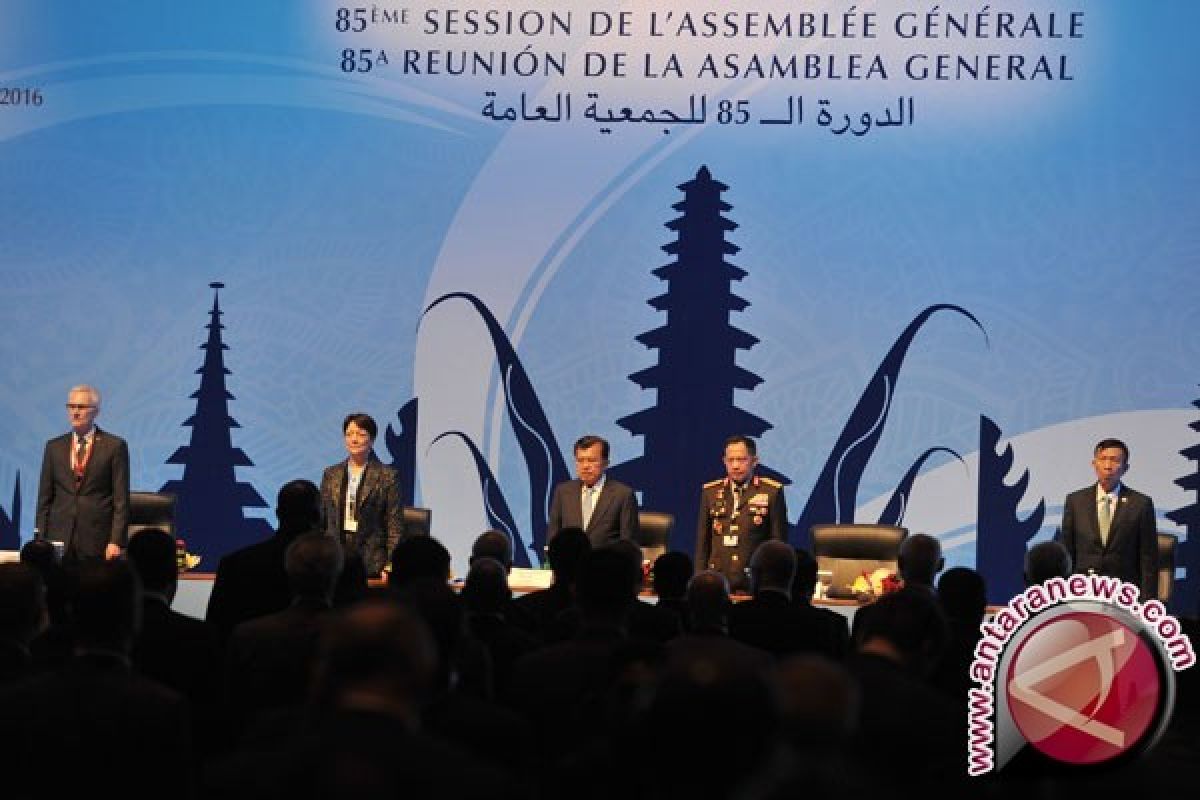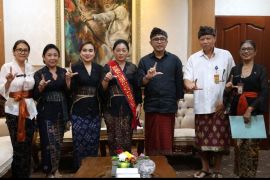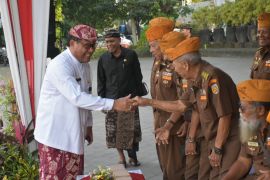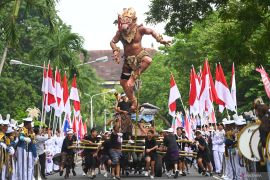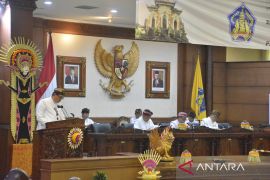Jakarta (Antara Bali) - The International Police (Interpol) is holding its 85th General Assembly in Nusa Dua, Bali, from Nov 7 to 10, 2016, with a main agenda to setting a global roadmap for international policing, and topics varying from terrorism to illegal fishing activities on the table of discussions.
"Identifying and meeting member countries security needs in the face of an ever-changing threat landscape is the focus of the Interpol General Assembly which opened in Bali, Indonesia today," the Interpol wrote on its official website following the opening of the major gathering by Indonesian Vice President M Jusuf Kalla on Nov 7.
The meeting is also expected to address the need for enhanced information sharing via Interpol particularly biometric data, to assist countries identify and interdict these potential threats, detection, investigation, prevention and prosecution of organized crime groups operating across a range of illicit markets.
Besides, some 830 police chiefs and senior law enforcement officials from 164 countries participating in the assembly also talk about the increasing sophistication and diversification of the modus operandi of cybercriminals will also be addressed during the conference.
"We are here because the Interpol General Assembly is a forum to realise global interests related to our shared responsibility in protecting and securing the global community. Good cooperation between law enforcement will help develop and maintain security and stability and support economic development in an ever-developing and borderless world," Kalla said in his opening remarks.
Interpol President Mireille Ballestrazzi said the Organization was better placed than ever to anticipate the challenges facing the global policing community.
"Interpols strategies to counter terrorism, organized and emerging crime and cybercrime, which will be presented during this conference, will provide crucial support in our united response to these global threats. However, to transform these plans from words into action requires full cooperation from all member countries," said President Ballestrazzi.
Chief of the Indonesian National Police, General Tito Karnavian said in combating terrorism, organized crime and cybercrime, Interpol is a very important partner in this multi-faceted fight, as it is the only organization which gives our international investigations effective outreach.
Interpol Secretary General J'rgen Stock said as the world faces an increasingly complex threat landscape Interpol will, and must, continue to seek the widest possible international police cooperation.
"No one country or region is safe from transnational crime threats, and it is Interpol's role to ensure that vital policing information from any of our 190 member countries is securely and swiftly placed in the hands of frontline officers, where it is needed most," concluded Mr Stock.
Besides, he praised the contribution of and the active role played by the Indonesian Police in the field of international cooperation, something the world community needs in these times.
"The Indonesian Police is one of the most supportive and active members in the international police cooperation framework," Stock said.
According to him, the Indonesian Police has been supporting many cross border operations, both in regional and international arenas.
Three major themes would be discussed at the meeting namely terrorism, organized crimes and cybercrimes.
In addition to terrorism, the meeting would also discuss transnational crimes such as money laundering, drug trafficking and corruption.
These serious crimes need international cooperation involving governments as well as NGOs, General Karnavian noted.
Karnavian and Maritime Affairs and Fisheries Minister Susi Pudjiastuti are among keynote speakers to address the General Assembly.
The National Police chief would share his experience in combating terrorism.
Meanwhile Pudjiastuti would point out a number of cases of illegal fishing in Indonesian waters and their impact on the environment.
Interpol General Secretariat is located in Lyon, France, and operates 24 hours a day, 365 days a year.
The group also has seven regional offices across the world and representative offices at the United Nations in New York and at the European Union in Brussels. Each of its member countries maintains a National Central Bureau staffed by its own highly trained law enforcement officials.
Its role is to enable police around the world to work together to make the world a safer place. Its high-tech infrastructure of technical and operational support helps meet the growing challenges of fighting crime in the 21st century.
The General Assembly is closed to the public, except for the opening and closing events, which include the election of the newest Interpol Chief to replace the incumbent Mireille Ballestrazzi.
The assembly is also scheduled to discuss the membership of Palestine and the threat posed by the Islamic State.
Palestine was granted an observer status at the UN in 2012, and since then it has joined several bodies such as Unesco and the International Criminal Court (ICC) in The Hague in a bid to be recognized as a state internationally.
To be admitted, the Palestine National Authority requires the support of two-thirds plus one of the 190 members, which could become a possibility, as 130 countries have already recognized Palestine as a State.
In total, some 1,360 delegates attend the opening of the 85th General Assembly.
Senior Commissioner Martinus Sitompul, spokesman of the Indonesian Police explained that 830 delegates attend the meeting. The delegates comprise 13 ministers from 13 countries, 59 police chiefs, 11 members of the Executive Committee of Interpol, 94 Head of Delegation of Interpol, 651 delegates of Interpol member countries, and two ambassadors.
About 429 non-delegates also attend the assembly. The delegates consist of 52 observers, 368 exhibitors and nine guests.
In addition, there are 101 people accompanying the delegates and the non-delegates.(WDY)


